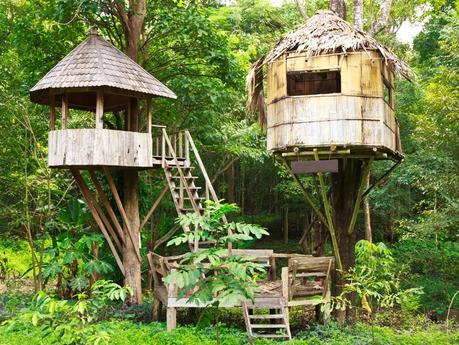Tree houses bring up many great childhood memories. It’s more of a fairy-like hide-out where kids go to play out their storybook inspired games. Not just a treehouse, it tells us how inoffensively we, humans, can coexist with nature.
If you want to recreate your wonderful childhood memories for your kids too, there are a few safety precautions and suggestions for the right tree when building a tree house. This includes selecting the right tree. Following are the tips for choosing the right tree for your tree house.
Best Trees For The Tree house
The most important thing to be considered for a tree house is the safety. Select a tree which is durable, robust, and sturdy enough to support your tree house. You have a variety of tree options which will go perfectly with the tree house provided the tree is healthy, strong, and mature. Nevertheless, deciduous trees incline to have thicker and deeper timber which can bear heavier loads. Following are the types of coniferous and deciduous trees which are best for a tree house:
- Beech
- Oak
- Maple
- Hemlock
- Ash
- Douglas-fire
- Cedar
Guidelines on Selecting the Right Tree
Some factors should be taken into account before choosing a tree for the tree house, such as health, maturity, and strength. However, the strength and health are the most vivacious characteristics. Following are some indicators which prove that the tree is unhealthy and should not be used as a tree house:
- Leaf discoloration
- A whole lot of dead branches
- Liquid exuding from the bark
- Patchy and inconsistent leaves on branch edges
Many trees are natural hosts for parasites and other plants. So, it is crucial to understand the natural risks associated with any tree species to manage accordingly. Trees are going to grow taller and wider, so make sure you leave enough room for them to expand without threatening the steadiness of your tree house.
Hardwood Trees
TABs (Tree house Attachment Bolts) are strong to the extent that they never break or bend under normal conditions, however, under excessive loads, TABs can compress the tree and damage the integrity of the wood. In this case, the limiting factor is the compressing strength of the wood. Hence, hardwood trees are recommended, such as a walnut tree, cherry tree, hickory tree, or oak tree etc.
The trees which should not be used to build a tree house, include spruce trees, pine trees, yellow poplar trees, or redwood trees. It doesn’t mean you can’t build a tree house in a white pine or tulip poplar; it only indicates that you should select the right potential tree fastenings, build only a single-storey tree house, design a small and low-weight tree house, or perhaps only a tree platform.
Height
If you want to have a celestial tree house for yourself, then you might want to go higher. The higher the tree house, the more awe-inspiring and picturesque view it will give. However, on account of safety measures, you cannot go very high as the risk of a fall is always associated with it.
Tree houses for kids should not be higher than 10 feet. Another thing that must be taken into account is the strength of the tree to withstand the effects of the wind. Tree houses should be formed in the lower third part of the tree, in the areas where wind velocities aren’t high.
Branch Thickness

Branch thickness is also a very important factor while building a tree house. You have to fix supports around the points on the stem. So, the stem must be enough thickness to hold the tree house it is supporting. Branch strength of trees varies from species to species. Oak, maple, beech, hemlock, and fir, are some of the excellent tree species when we talk about the branch strength. Choose one of them for building a heavenly tree house.
Professional Evaluation
Last but not the least, get the professional evaluation of your tree by an experienced arborist. They will tell you if the tree you want to build your tree house on is suitable for the job or not. So are you ready to build your tree house?
Daniel Stone

Daniel has worked in the management, cutting, and caring of trees for the last 20 years. He works and helps run Bellarine Trees and is passionate about the environment and tree worker safety. He has a wife and two daughters and he enjoys playing tennis in his spare time.
